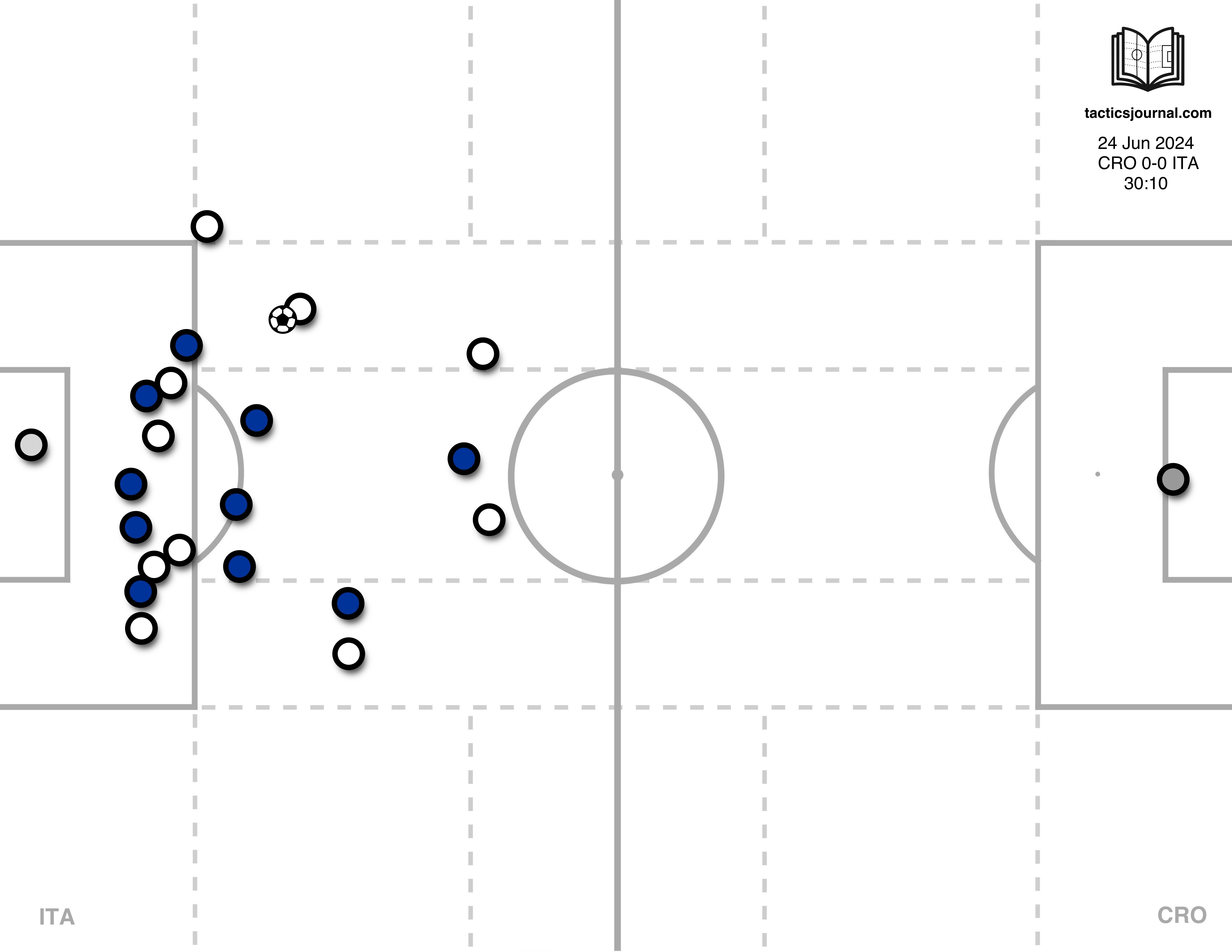To defend or defend with the ball
25 June 2024
Flip between the two matches, and you see two opposite ways to approach a deciding match. Italy sat back and allowed Croatia to endlessly attack. Spain defended by keeping the ball from Albania. It is much harder to score when you do not have the ball.

When you defend in your own end, you have to set up your team to counter. Italy’s forwards don’t have a ton of pace, especially when Chiesa is on the bench; therefore, they are of little threat on the counter. They had to commit to only defending. They are betting that an experienced Croatia will not score.
The moment Luka Modric puts it past Donnarumma, it is a race against the clock. Italy has to scramble. They have to change to a more attacking formation, strikers come on for defenders and midfielders, and the momentum is not on their side.
You could argue that there are pros to this approach. Croatia has been attacking the entire match, they aren’t in a rhythm to defend. Their goalkeeper, Dominik Livakovic, is cold; he hasn’t had to make many saves. If Italy can generate a high volume of chances, they might catch Croatia in a bad moment. The time crunch to try to find the goal when you haven’t been attacking or maintaining possession the entire game is the risk.
Spain, on the other hand, defends with the ball. They maintain possession the entire match; they won’t feel obligated to rush to attack the box, and they won’t allow the opposition to have the ball. Instead of endless defending, it’s endless passing. The only way Albania can score is if there is a massive mistake.
Hypothetically, say Albania finds a way to score. The only con to this approach to keeping the ball is if Spain has trouble generating chances prior to conceding. If you’ve been dominating possession the entire match and haven’t scored, it is hard to think of new ways to enter the box in a time crunch. Players might become desperate, try to shoot from outside the box, and rush chances.
Unlike Croatia, Albania would be used to defending because they’ve been defending the entire game. Neither team will have ways to make many meaningful adjustments through subbing players on or changing the structure of the team. It comes down to individual impact players and moments.
The pro of keeping the ball is that if you are good at generating chances when the opposition is pinned back in their own half, like Spain and Italy can be on a good day, then there’s not this mad dash. It becomes a simple game of converting. Even though Albania hypothetically scored, Spain would have the momentum because now you expect them to tie the game. In reality, Albania never scored because Spain was good at keeping the ball.
Spain had already qualified for the next round before the match, with first place in the group locked down. They would have wanted to keep the winning rhythm going against Albania, but they didn’t have anything to play for. Albania still had a slim chance to win to take second or third place from Italy or Croatia. I know that Spain would have approached this match in the same way they did if they needed a draw or win.
Italy did not have to win to advance out of the group stage; all they needed was a draw. In a high-stakes match such as this, it is hard to bet against Croatia not scoring. A team of Croatia’s quality, with their vast amount of experience in tournaments, should squeak out a goal, which they did.
In my opinion, Italy has enough quality in defense and midfield to circulate the ball and maintain possession at the back. I don’t think it was necessary to take the risk of defending first; I prefer when teams defend with the ball. Luckily for them, they got the draw with Zaccagni’s dramatic 97th minute equalizer, and they advance with Spain to the round of 16.
Match: Croatia 1-1 Italy and Albania 0-1 Spain, 24 June 2024
2026
January
- 18th
2025
December
- 26th
- 21st
- 16th
- 7th
- 3rd
November
- 29th
- 24th
- 20th
- 14th
- 12th
- 8th
- 7th
- 4th
- 2nd
October
- 31st
- 28th
- 22nd
- 20th
- 19th
- 12th
September
- 30th
- 28th
- 26th
- 24th
- 23rd
- 20th
- 18th
- 16th
- 14th
- 4th
- 3rd
- 1st
August
- 28th
- 27th
- 26th
- 25th
- 24th
- 23rd
- 20th
- 17th
- 14th
- 12th
- 10th
- 8th
- 4th
July
- 10th
- 5th
- 4th
June
- 29th
- 14th
- 13th
- 12th
- 2nd
May
- 29th
- 25th
- 22nd
- 20th
- 15th
- 8th
April
- 30th
- 9th
March
- 28th
- 5th
February
- 26th
- 20th
- 19th
- 12th
- 8th
January
- 31st
- 30th
- 16th
- 12th
- 9th
- 8th
- 7th
- 6th
- 5th
- 4th
- 3rd
- 2nd
- 1st
2024
December
- 31st
- 30th
- 29th
- 28th
- 27th
- 26th
- 25th
- 24th
- 23rd
- 22nd
- 21st
- 20th
- 19th
- 18th
- 17th
- 16th
- 15th
- 14th
- 13th
- 12th
- 11th
- 10th
- 9th
- 8th
- 7th
- 6th
- 5th
- 4th
- 3rd
- 2nd
- 1st
November
- 30th
- 29th
- 28th
- 27th
- 26th
- 25th
- 24th
- 23rd
- 22nd
- 21st
- 20th
- 19th
- 18th
- 18th
- 16th
October
- 21st
- 12th
- 11th
- 9th
- 7th
- 6th
- 4th
- 3rd
- 2nd
- 1st
September
- 30th
- 29th
- 27th
- 26th
- 25th
- 24th
- 23rd
- 22nd
- 21st
- 20th
- 19th
- 18th
- 17th
- 16th
- 15th
- 14th
- 13th
- 12th
- 11th
- 10th
- 9th
- 8th
- 7th
- 6th
- 5th
- 4th
- 4th
- 3rd
- 2nd
- 1st
August
- 31st
- 30th
- 29th
- 28th
- 27th
- 26th
- 25th
- 25th
- 24th
- 23rd
- 22nd
- 21st
- 20th
- 20th
- 19th
- 19th
- 18th
- 17th
- 16th
- 15th
- 14th
- 14th
- 13th
- 12th
- 11th
- 10th
- 9th
- 8th
- 7th
- 7th
- 6th
- 5th
- 4th
- 3rd
- 2nd
- 1st
July
- 31st
- 30th
- 29th
- 28th
- 27th
- 26th
- 25th
- 24th
- 23rd
- 22nd
- 21st
- 20th
- 19th
- 18th
- 17th
- 16th
- 15th
- 15th
- 14th
- 13th
- 11th
- 10th
- 9th
- 8th
- 7th
- 6th
- 5th
- 4th
- 3rd
- 2nd
- 1st
June
- 30th
- 29th
- 28th
- 27th
- 26th
- 25th
- 24th
- 23rd
- 22nd
- 21st
- 20th
- 19th
- 18th
- 17th
- 16th
- 15th
- 14th
- 13th
- 12th
- 11th
- 10th
- 9th
- 8th
- 7th
- 6th
- 5th
- 4th
- 3rd
- 2nd
- 1st
May
- 31st
- 30th
- 29th
- 28th
- 27th
- 26th
- 25th
- 24th
- 23rd
- 22nd
- 21st
- 20th
- 20th
- 19th
- 18th
- 17th
- 16th
- 15th
- 14th
- 13th
- 12th
- 11th
- 10th
- 9th
- 8th
- 7th
- 6th
- 5th
- 4th
- 3rd
- 2nd
- 1st
April
- 30th
- 29th
- 28th
- 27th
- 26th
- 25th
- 24th
- 23rd
- 22nd
- 21st
- 20th
- 19th
- 17th
- 16th
- 15th
- 14th
- 13th
- 12th
- 11th
- 10th
- 9th
- 8th
- 7th
- 6th
- 5th
- 3rd
- 2nd
- 1st
March
- 31st
- 30th
- 29th
- 28th
- 27th
- 26th
- 25th
- 24th
- 23rd
- 21st
- 20th
- 19th
- 18th
- 17th
- 16th
- 15th
- 14th
- 13th
- 12th
- 11th
- 10th
- 9th
- 8th
- 7th
- 6th
- 5th
- 4th
- 3rd
- 1st
February
- 28th
- 27th
- 26th
- 25th
- 23rd
- 22nd
- 21st
- 20th
- 18th
- 15th
- 14th
- 13th
- 12th
- 11th
- 8th
- 7th
- 6th
- 5th
- 4th
- 3rd
- 2nd
- 1st
January
- 31st
- 30th
- 29th
- 28th
- 27th
- 25th
- 24th
- 22nd
- 21st
- 20th
- 18th
- 17th
- 16th
- 15th
- 14th
- 13th
- 12th
- 11th
- 9th
- 8th
- 7th
- 6th
- 5th
- 4th
- 3rd
- 2nd
- 1st
2023
December
- 31st
- 29th
- 28th
- 27th
- 25th
- 24th
- 22nd
- 21st
- 20th
- 19th
- 18th
- 17th
- 16th
- 15th
- 13th
- 12th
- 11th
- 10th
- 8th
- 7th
- 6th
- 4th
- 3rd
- 2nd
- 1st
November
- 30th
- 29th
- 28th
- 27th
- 26th
- 25th
- 24th
- 23rd
- 22nd
- 21st
- 20th
- 18th
- 17th
- 16th
- 15th
- 14th
- 13th
- 12th
- 11th
- 10th
- 9th
- 8th
- 7th
- 6th
- 5th
- 4th
- 3rd
October
- 31st
- 30th
- 29th
- 27th
- 26th
- 25th
- 24th
- 23rd
- 22nd
- 19th
- 17th
- 15th
- 14th
- 13th
- 12th
- 11th
- 10th
- 9th
- 8th
- 7th
- 6th
- 5th
- 4th
- 1st
September
- 30th
- 28th
- 26th
- 25th
- 24th
- 22nd
- 21st
- 20th
- 19th
- 18th
- 17th
- 9th
- 3rd
August
- 31st
- 28th
- 27th
- 26th
- 21st
- 20th
- 15th
- 14th
- 13th
- 12th
- 7th
- 4th
- 3rd
July
- 31st
- 30th
- 28th
- 27th
- 25th
- 24th
- 23rd
- 22nd
- 21st
- 20th
- 19th
- 18th
- 17th
- 16th
- 15th
- 14th
- 13th
- 12th
- 11th
- 10th
- 9th
- 8th
- 7th
- 6th
- 5th
- 4th
- 3rd
June
- 11th
- 10th
- 7th
- 5th
- 4th
- 1st
May
- 28th
- 27th
- 26th
- 25th
- 24th
- 23rd
- 22nd
- 21st
- 20th
- 19th
- 18th
- 17th
- 16th
- 15th
- 14th
- 13th
- 11th
- 10th
- 9th
- 8th
- 7th
- 5th
- 4th
- 3rd
- 2nd
- 1st
April
- 29th
- 28th
- 27th
- 26th
- 25th
- 24th
- 23rd
- 22nd
- 22nd
- 21st
- 20th
- 2nd
March
- 6th
February
- 27th
- 20th
- 5th
January
- 19th
